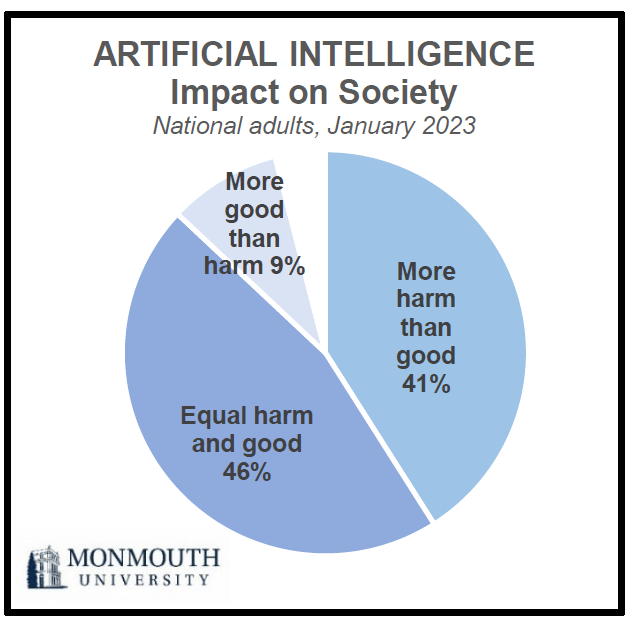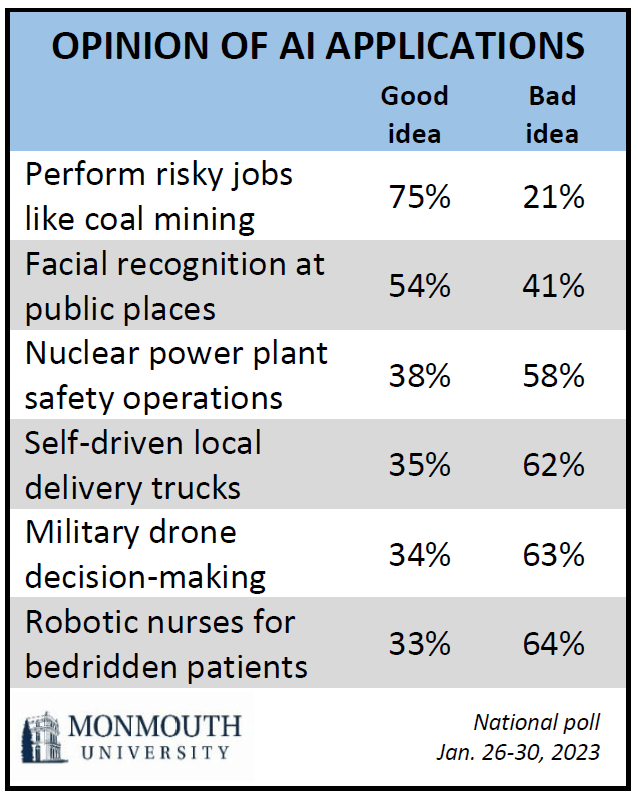West Long Branch, NJ – Artificial intelligence. We’ve heard about it. We use it. But we are not necessarily comfortable with what the future holds. The Monmouth (“Mon-muth”) University Poll finds awareness of AI developments has increased over the past decade, but opinion about its potential impact remains largely unchanged, with a few exceptions. Most Americans express concern about the impact of new products such as ChatGPT and offer their support to the use of AI in just a few types of applications. That skepticism comes even though nearly half actually use one form of AI – voice recognition – on a regular basis.
One-third (35%) of the public reports hearing a lot about recent artificial intelligence developments regarding the ability of computers and machines to carry out decision-making thought processes similar to humans. This level of awareness is much higher than eight years ago (12%). The biggest increase has been among younger adults. In 2015, just 12% of 18- to 34-year-olds heard a lot about recent developments in the field. Today, nearly half (45%) this age group says the same. Overall, more men (46%) than women (24%) have heard a lot about recent AI developments. Fully 9 in 10 Americans (91%) are aware of the term artificial intelligence, which is up from 70% in 2015.
One of the newer AI products is ChatGPT, an application that can have conversations and write entire essays based on a few human prompts. Six in ten (60%) Americans have heard about this product and 72% believe there will be a time when entire news articles will be written by artificial intelligence. However, very few see this as a positive development. In fact, more than 3 in 4 (78%) say that news articles written by AI would be a bad thing. Furthermore, 65% say it is very likely that AI programs such as ChatGPT will be used by students to cheat on their schoolwork.
“AI has started to permeate every facet of life. Most Americans are skeptical that this is a good thing, even though many of them use some form of artificial intelligence on a regular basis already,” said Patrick Murray, director of the independent Monmouth University Polling Institute.
Overall, only 1 in 10 (9%) Americans believe computer scientists’ ability to develop AI would do more good than harm to society. The remainder are divided between saying AI would do equal amounts of harm and good (46%) or that it would actually do more harm to society overall (41%). These results are largely unchanged from Monmouth’s poll in 2015, but public opinion continues to be more pessimistic about AI’s impact than it was a generation ago. When this same question was asked in 1987 by Cambridge Reports/Research International, 20% of Americans said AI would do more good than harm, 29% expected equal amounts of harm and good, and 39% said it would do more harm overall.

Nearly 3 in 4 (73%) Americans feel that machines with the ability to think for themselves would hurt jobs and the economy. Also, a majority (56%) say that artificially intelligent machines would hurt humans’ overall quality of life. These results on AI’s daily impact are basically the same as eight years ago. However, existential fears about humanity’s relationship with artificial intelligence have increased. A majority (55%) of Americans are now worried at least somewhat that artificially intelligent machines could one day pose a risk to the human race’s existence. This marks a reversal from Monmouth’s 2015 poll, when a smaller number (44%) was worried and a majority (55%) was not. Concern about the possible AI threat to human existence decreases with age – from 61% of those age 55 and older, to 55% of those ages 35 to 54, and 46% of those ages 18 to 34. However, the level of concern is similar for people who have been paying a lot of attention to AI news and those who have heard only a little or nothing about recent developments.
Some political leaders have floated the idea of having a federal agency regulate the use of artificial intelligence similar to how the FDA regulates the approval of drugs and medical devices. A majority (55%) of the public favors a general proposal for an AI regulatory agency, while 41% are opposed. The broadest level of support for this type of agency comes from adults under 35 years old (76%) – compared with just under half of those age 35 and older who agree. More Democrats (70%) and independents (56%) than Republicans (36%) support having a federal regulatory agency for AI.
“It seems as if some people view AI not just as a technological and economic concern, but also as a public health matter,” said Murray.
Monmouth pollsters tested reaction to six practical applications involving artificial intelligence, five of which were also asked about in 2015. For the new item in the poll – using facial recognition technology that can identify and monitor people who try to enter public places such as stadiums – a majority (54%) see it as a good idea while 41% say it is a bad idea. Interestingly, those who have heard a lot of recent developments in the field (45%) are less likely to endorse this use of AI than are those who have heard only a little (56%) or nothing (71%) about these developments.
“Facial recognition has been in the news recently, such as theaters using it to bar entry to lawyers who are suing them and unreliability of the technology depending on the person’s race. My guess is that people who have been following the news closely are more likely to be aware of these incidents and are concerned about their misuse, whereas those not paying as much attention are thinking primarily of immediate safety threats when asked about the use of facial recognition technology,” said Murray.
The only other application tested in the poll that is seen as a good idea by most Americans is using AI machines to perform risky jobs such as coal mining (75%). For other possible uses asked about in the poll, only about one-third of the public feels they are good ideas, including machines that monitor and make decisions about safety operations at nuclear power plants (38%), self-driven local delivery trucks (35%), armed military drones that can distinguish enemy combatants from civilians and decide which buildings to attack (34%), and robotic nurses for bedridden patients that can diagnose situations and administer medicine (33%). Compared to public opinion eight years ago, positive reaction to AI military drones has dropped slightly while support for self-driving delivery trucks has increased a bit, but is still clearly in the minority. Otherwise, public opinion of specific AI applications is largely in line with Monmouth’s 2015 poll.

“There is a lot of skepticism about certain real-world applications for artificial intelligence. It is interesting that familiarity with AI increases support for some uses but actually leads to a more negative reaction for other possible uses,” said Murray.
The Monmouth University Poll finds nearly half (47%) of the American public relies on computer technology a great deal in their daily lives – up from 37% eight years ago. This includes 71% of 18- to 35-year-olds (up from 43% in 2015), 53% of 35- to 54-year-olds (up from 42%), and 25% of those age 55 and older (unchanged from 26%).
Just under half report using one particular AI technology – voice recognition – on a weekly basis, including 23% who do so every day, 16% who do so several times a week, and 7% who do this once a week. Just under 1 in 4 (38%) Americans say they never use a voice recognition toll like Siri, Alexa, or Google Assistant. About half of those under age 55 and one-third of those age 55 and older use voice recognition technology at least weekly.
The Monmouth University Poll was conducted by telephone from January 26 to 30, 2023 with 805 adults in the United States. The question results in this release have a margin of error of +/- 5.7 percentage points for the full sample. The poll was conducted by the Monmouth University Polling Institute in West Long Branch, NJ.
QUESTIONS AND RESULTS
(* Some columns may not add to 100% due to rounding.)
[Q1-20 previously released.]
21.Have you heard of the term Artificial Intelligence or A.I., or have you not heard of this?
| Trend: | Jan. 2023 | April 2015 |
|---|---|---|
| Yes, have heard | 91% | 70% |
| No, have not heard | 9% | 30% |
| (n) | (805) | (1,005) |
22.Artificial intelligence is the ability of computers and machines to carry out decision-making and thought processes similar to humans, sometimes referred to as computers being able to think for themselves. How much have you read or heard about recent developments in this area – a lot, a little, or nothing at all?
| Trend: | Jan. 2023 | April 2015 |
|---|---|---|
| A lot | 35% | 12% |
| A little | 52% | 53% |
| Nothing at all | 13% | 35% |
| (n) | (805) | (1,005) |
23.If computer scientists really were able to develop computers with artificial intelligence, what effect do you think this would have on society as a whole? Would it do more good than harm, more harm than good, or about equal amounts of harm and good?
| Trend: | Jan. 2023 | April 2015 |
|---|---|---|
| More good than harm | 9% | 11% |
| More harm than good | 41% | 42% |
| About equal amounts of harm and good | 46% | 43% |
| (VOL) Don’t know | 3% | 4% |
| (n) | (805) | (1,005) |
24.Do you think having machines with the ability to think for themselves will help or hurt jobs and the economy?
| Trend: | Jan. 2023 | April 2015 |
|---|---|---|
| Help | 19% | 19% |
| Hurt | 73% | 72% |
| (VOL) Depends | 5% | 5% |
| (VOL) Don’t know | 4% | 4% |
| (n) | (805) | (1,005) |
25.Do you think having machines with the ability to think for themselves will help or hurt human beings’ quality of life?
| Trend: | Jan. 2023 | April 2015 |
|---|---|---|
| Help | 34% | 35% |
| Hurt | 56% | 54% |
| (VOL) Depends | 6% | 6% |
| (VOL) Don’t know | 4% | 5% |
| (n) | (805) | (1,005) |
26.Have you heard about A.I. products – such as ChatGPT – that can have conversations with you and write entire essays based on just a few prompts from humans?
| Response: | Jan. 2023 |
|---|---|
| Yes | 60% |
| No | 40% |
| (n) | (805) |
27A.Do you think there will be a time when entire news articles will be written by artificial intelligence, or not?
| Response: | Jan. 2023 |
|---|---|
| Yes | 72% |
| No | 24% |
| (VOL) Don’t know | 4% |
| (n) | (805) |
27B.Do you think it would be a good thing or a bad thing if news articles were written by artificial intelligence?
| Response: | Jan. 2023 |
|---|---|
| Good | 13% |
| Bad | 78% |
| (VOL) Depends | 7% |
| (VOL) Don’t know | 3% |
| (n) | (805) |
28.How likely do you think it is that students will be able use A.I. programs like ChatGPT to cheat on their schoolwork – very likely, somewhat likely, not too likely, or not at all likely?
| Response: | Jan. 2023 |
|---|---|
| Very likely | 65% |
| Somewhat likely | 24% |
| Not too likely | 6% |
| Not at all likely | 3% |
| (VOL) Don’t know | 2% |
| (n) | (805) |
29.I am going to read you some examples of how artificial intelligence can be used. For each, please tell me whether you think it would be a good idea or bad idea to use machines with artificial intelligence to do these tasks [READ ITEM] Is that a good idea or bad idea? [ITEMS WERE ROTATED]
Armed military search drones that distinguish between enemy combatants and civilian bystanders and decide which buildings to attack
| Trend: | Jan. 2023 | April 2015 |
|---|---|---|
| Good idea | 34% | 40% |
| Bad idea | 63% | 54% |
| (VOL) Depends | 2% | 3% |
| (VOL) Don’t know | 2% | 3% |
| (n) | (805) | (1,005) |
Robotic nurses for bedridden patients that can diagnose situations and decide when to administer medicine.
| Trend: | Jan. 2023 | April 2015 |
|---|---|---|
| Good idea | 33% | 31% |
| Bad idea | 64% | 65% |
| (VOL) Depends | 1% | 2% |
| (VOL) Don’t know | 2% | 2% |
| (n) | (805) | (1,005) |
Self-driven local delivery trucks
| Trend: | Jan. 2023 | April 2015 |
|---|---|---|
| Good idea | 35% | 29% |
| Bad idea | 62% | 67% |
| (VOL) Depends | 1% | 2% |
| (VOL) Don’t know | 2% | 2% |
| (n) | (805) | (1,005) |
Machines that perform risky jobs such as coal mining
| Trend: | Jan. 2023 | April 2015 |
|---|---|---|
| Good idea | 75% | 76% |
| Bad idea | 21% | 20% |
| (VOL) Depends | 1% | 2% |
| (VOL) Don’t know | 2% | 2% |
| (n) | (805) | (1,005) |
Machines that monitor and make decisions about the safety operations of a nuclear power plant
| Trend: | Jan. 2023 | April 2015 |
|---|---|---|
| Good idea | 38% | 35% |
| Bad idea | 58% | 60% |
| (VOL) Depends | 2% | 2% |
| (VOL) Don’t know | 2% | 3% |
| (n) | (805) | (1,005) |
Facial recognition technology that can identify and monitor people who try to enter public places such as stadiums
| Response: | Jan. 2023 |
|---|---|
| Good idea | 54% |
| Bad idea | 41% |
| (VOL) Depends | 3% |
| (VOL) Don’t know | 2% |
| (n) | (805) |
30.Would you favor or oppose having a federal agency regulate the use of artificial intelligence similar to how the FDA regulates the approval of drugs and medical devices?
| Response: | Jan. 2023 |
|---|---|
| Favor | 55% |
| Oppose | 41% |
| (VOL) Don’t know | 4% |
| (n) | (805) |
31.How worried are you that machines with artificial intelligence could eventually pose a threat to the existence of the human race – very, somewhat, not too, or not at all worried?
| Trend: | Jan. 2023 | April 2015 |
|---|---|---|
| Very worried | 25% | 16% |
| Somewhat worried | 30% | 28% |
| Not too worried | 28% | 28% |
| Not at all worried | 16% | 27% |
| (VOL) Don’t know | 0% | 1% |
| (n) | (805) | (1,005) |
32.How much do you rely on computers and technology in your daily life – a great deal, some, not much, or not at all?
| Trend: | Jan. 2023 | April 2015 |
|---|---|---|
| Great deal | 47% | 37% |
| Some | 31% | 32% |
| Not much | 17% | 21% |
| Not at all | 5% | 10% |
| (VOL) Don’t know | 0% | 0% |
| (n) | (805) | (1,005) |
33.How often do you use voice recognition technology, such as Siri, Alexa, or Google Assistant – every day, a few times a week, once a week, less than once a week, or never?
| Response: | Jan. 2023 |
|---|---|
| Every day | 23% |
| A few times a week | 16% |
| Once a week | 7% |
| Less than once a week | 16% |
| Never | 38% |
| (VOL) Don’t know | 0% |
| (n) | (805) |
[Q34-39 previously released.]
Methodology
The Monmouth University Poll was sponsored and conducted by the Monmouth University Polling Institute from January 26 to 30, 2023 with a probability-based national random sample of 805 adults age 18 and older. This includes 281 contacted by a live interviewer on a landline telephone and 524 contacted by a live interviewer on a cell phone, in English. Telephone numbers were selected through a mix of random digit dialing and list-based sampling. Landline respondents were selected with a modified Troldahl-Carter youngest adult household screen. Interviewing services were provided by Braun Research, with sample obtained from Dynata (RDD, n= 569), Aristotle (list, n= 152) and a panel of prior Monmouth poll participants (n= 84). Monmouth is responsible for all aspects of the survey design, data weighting and analysis. The full sample is weighted for region, age, education, gender and race based on US Census information (ACS 2021 one-year survey). For results based on this sample, one can say with 95% confidence that the error attributable to sampling has a maximum margin of plus or minus 5.7 percentage points (adjusted for sample design effects). Sampling error can be larger for sub-groups (see table below). In addition to sampling error, one should bear in mind that question wording and practical difficulties in conducting surveys can introduce error or bias into the findings of opinion polls.
DEMOGRAPHICS (weighted) |
| Self-Reported |
| 27% Republican |
| 42% Independent |
| 31% Democrat |
| 49% Male |
| 51% Female |
| 28% 18-34 |
| 33% 35-54 |
| 39% 55+ |
| 61% White |
| 12% Black |
| 17% Hispanic |
| 10% Asian/Other |
| 67% No degree |
| 33% 4 year degree |
Click on pdf file link below for full methodology and crosstabs by key demographic groups.




